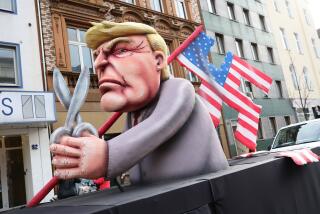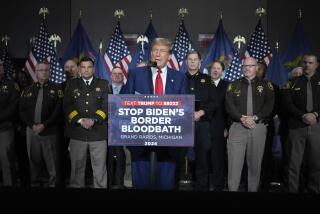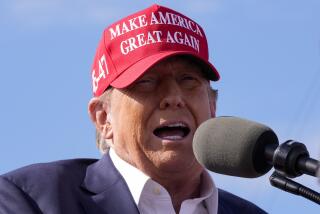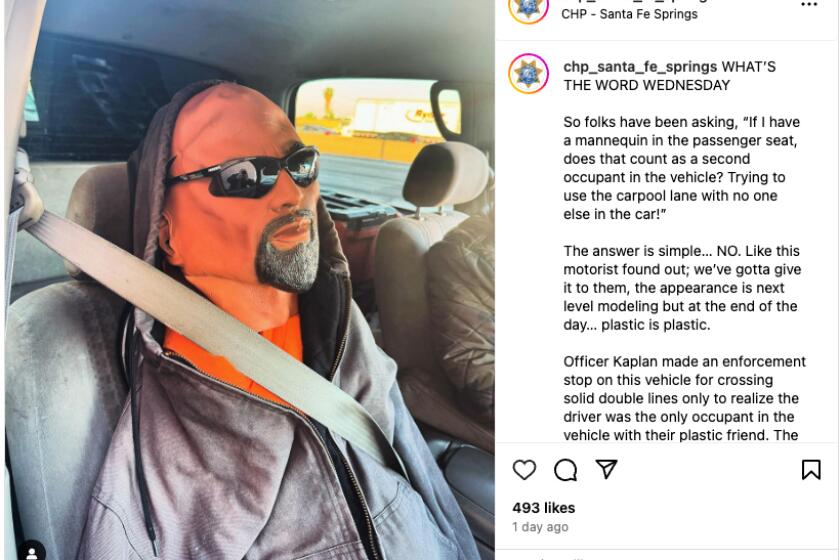Trump’s rhetoric on Muslims echoes WWII hysteria over Japanese Americans
It was strikingly fitting that Donald Trump’s bombast about blocking the entry of foreign Muslims into America came on Pearl Harbor Day.
It was coincidental but clueless. Ironic and insensitive.
Japan’s sneak attack on the U.S. fleet in Hawaii 74 years ago set off the demagogic drumbeat that forced 110,000 innocent American citizens and legal residents of Japanese descent into detention camps during World War II.
That was one of the most shameful acts in our history. It was a particular blight on California, which already had a long, disgraceful record of anti-Asian bigotry and where many of the imprisoned victims were uprooted at gunpoint.
But we shouldn’t be too smug about that old atrocity. Under similar circumstances of fear, desperation and crisis, we can’t be certain it wouldn’t happen again.
Trump, a front-runner in polls for one of the nation’s two major presidential nominations, proved Monday that fear-mongering lingers loud into the 21st century.
In a prepared statement — which means the Republican candidate wasn’t just shooting off his mouth again, he’d actually thought about it —Trump called for “a total and complete shutdown of Muslims entering the United States” until elected officials “can figure out what is going on.” That could mean indefinitely.
Trump has been widely denounced by establishment Republicans, including campaign rivals. But the scary thing is that many GOP voters like what they’ve been hearing, whether it’s labeling Mexican immigrants rapists, insulting women or equating all Muslims with terrorists.
He still leads most polls when Republican voters are asked whom they prefer to carry the GOP banner next year.
Moreover, a poll published Wednesday found that nearly two-thirds of likely Republican primary voters favor Trump’s anti-Muslim proposal. In fact, more than a third said it makes them more likely to vote for him. Among voters of all political persuasions, Trump’s plan is backed by more than a third.
“These numbers are made up of some people who are truly expressing religious bigotry and others who are fearful about terrorism and are willing to do anything they think might make us safer,” said Doug Usher, who directed the Bloomberg Politics/Purple Strategies PulsePoll.
That sounds like an echo of 1941 hysteria.
Trump didn’t call for dragging Muslims from their homes and locking them behind barbed wire and guard towers. He wasn’t endorsing what happened in World War II, he said. But not being around then, he added, he couldn’t judge.
“Highly respected” President Roosevelt, he noted, did authorize the internment camps because the nation was at war. And now we’re “at war with radical Islam.”
West Coast residents were particularly frightened after Pearl Harbor. The enemy could be on our beaches any day. Politicians railed about all those so-called Japanese sympathizers living among us, the potential saboteurs.
One winter night, the Los Angeles County sheriff arrested 20 Japanese Americans, claiming they had shot up flares from their homes signaling enemy planes. There were no flares. There were no planes. Only false rumors.
Sort of like Trump claiming that he saw on TV thousands of New Jersey Muslims cheering as the World Trade Center towers collapsed during the 9/11 terrorist attack. That hallucination has been thoroughly debunked by law enforcement and TV.
One influential advocate of the World War II internment camps was then-California Atty. Gen. Earl Warren, en route to being elected governor and ultimately the U.S. chief justice who wrote the historic decision that led to the end of racial segregation in schools.
In his memoir, Warren wrote that he “deeply regretted” his role in locking up Japanese Americans “because it was not in keeping with our American concept of freedom and the rights of citizens.”
Trump’s latest demagoguery was triggered by a radicalized Muslim couple shooting up a holiday office party in San Bernardino, killing 14 and wounding 21. That was tragic for the victims and their families. And it came after Islamic terrorists killed at least 130 in Paris. But what if we’d been hit by another Pearl Harbor?
After 9/11, we didn’t ban Muslims from America. But we did lash out against Iraq for bogus reasons, spilling blood and treasure in a disastrous war. The other presidential front-runner, Democrat Hillary Rodham Clinton, voted for that foolishness.
Could the post-Pearl Harbor injustice be repeated?
“Certainly it could,” says U.S. Rep. Mike Honda (D-San Jose), who as a preschooler was one of the Japanese American citizens imprisoned. “You have to understand our history. It doesn’t always jibe with the expectations.”
Jack Pitney, political science professor at Claremont McKenna College and a former national GOP official, says: “I hope that it couldn’t happen again, that the safeguards of civil liberties are more deeply entrenched than they were in 1941.
“Even though bigotry is present, you get more pushback today. We’ve advanced as a society, although not as much as we’d hope.”
As for Trump, Pitney says: “Right now the political campaign is roughly equivalent to a late-night bar conversation. When people start focusing on choosing a president, Trump’s numbers are going to change.”
But Tony Quinn, a political analyst and former Republican legislative staffer, says: “I’ve concluded that Trump can’t be stopped. His support seems so deep and wide. He knows how to connect with an audience. He simplifies.”
Maybe. Too many Americans are susceptible to stupidity, shamelessness and scapegoating.
Twitter: @LATimesSkelton
MORE ON DONALD TRUMP
Analysis: Ignoring Donald Trump didn’t work for Republicans. What now?
Britain has no plans to ban Trump over his comments as more than 224,000 petition to bar him
More to Read
Start your day right
Sign up for Essential California for news, features and recommendations from the L.A. Times and beyond in your inbox six days a week.
You may occasionally receive promotional content from the Los Angeles Times.







